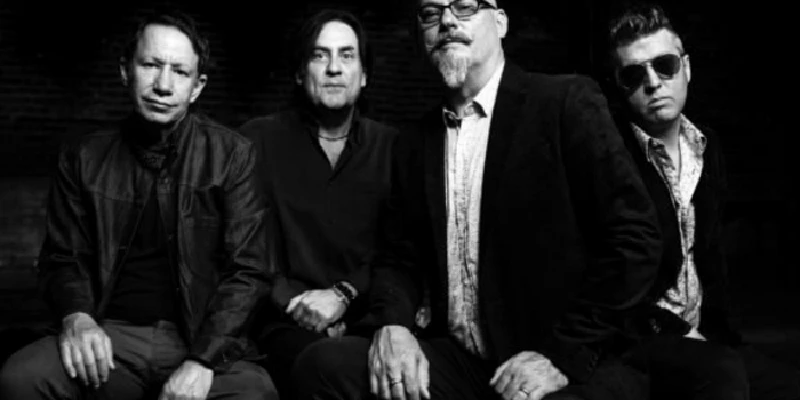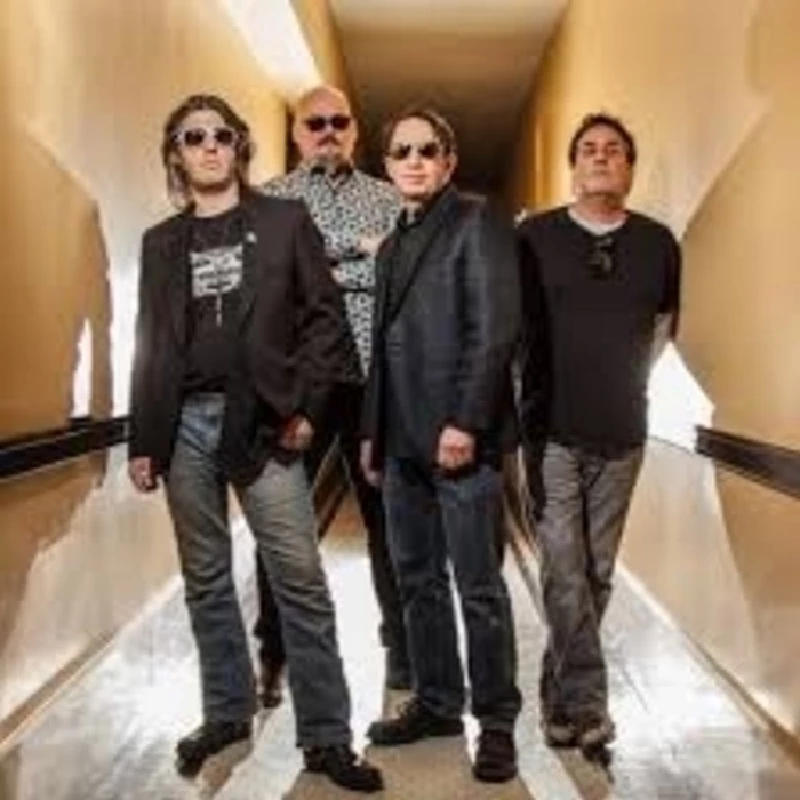Pedaljets - Interview
by Kimberly Bright
published: 10 / 4 / 2020

intro
Kimberly Bright chats with singer-songwriter-guitarist Mike Allmayer from the Pedaljets about the Kansas City band’s long history, reunion, second chance and new album 'Twist the Lens'.
All major cities have a music scene of some kind, even if it has never been publicly celebrated or acknowledged outside of a particular region. A lazy cursory history of American indie rock over the past thirty-five years reveres a handful of scenes and stubbornly ignores others in between. Everyone is familiar with Seattle, Austin, Minneapolis and Chicago, but Dayton, Durham and Lawrence not so much. One of the best things about the punk magazine 'Maximumrocknroll' has always been the smaller local scene reports sent in from around the world. Kansas City, Kansas and nearby Lawrence are home to a music scene that is big enough to sustain several bands but small enough to maintain a sense of community. The area is known for The Get Up Kids, Paw, The Anniversary, White Flight. The pre-grunge indie rock/college rock scene of the late ‘80s and early ‘90s included bands such as Sin City Disciples, The Embarrassment, Microknotz, Get Smart, Kill Creek, and of course, the Pedaljets, a respected, long-standing indie rock band with an unusual history of amazing strokes of luck and bad timing. The Pedaljets’ singer-songwriter and guitarist Mike Allmayer started the band with drummer Rob Morrow and bass player Matt Kesler when he was a student at the University of Kansas in Lawrence in 1984. The area music scene at the time consisted of what he describes as mostly bar bands simply playing covers, with clubs grudgingly relegating original material to occasional Monday nights. Lawrence is also known as the long-time hometown of Beat writer William S. Burroughs. Orginal drummer Darrell Laham’s girlfriend at the time was a cashier at a local supermarket and insisted that she had spotted Burroughs shopping there, a well-dressed old white man in a fedora. Not long after her sighting, sure enough, Mike himself once ran into Burroughs in an aisle at that grocery and was awestruck. Horrified at being recognised, Burroughs quickly turned around and pushed his cart in the opposite direction. The Pedaljets were forced to play farther afield than their hometown in order to play their own music. A chance meeting with Bob Mould after opening for Hüsker Dü at Liberty Hall in Lawrence provided the connection that they needed. The band stayed at the Pedaljets’ house and stayed up all night, fortified by gin and tonics, talking shop. Bob Mould took the Pedajets under his wing, explained how to run a band successfully and tour without ending up starving and stranded with an empty gas tank on I-35 somewhere. He invited the band to join Hüsker Dü on tour whenever they wanted, which turned out to be quite a lot. “He basically told us, 'Why don't you come out on this tour? You're not going to make a hell of a lot of money but you’ll make enough for gas and to get to the next floor to sleep on.'” For six years the Pedaljets toured clubs and college towns heavily, barely having time to pause to write new songs and record. They opened for bands like the Replacements, Flaming Lips, the Meat Puppets, and Soul Asylum, and at one point were shanghai’ed into jamming on stage with a malodorously perfumed Prince at 7th Street Entry/First Avenue in Minneapolis. While working outside of the Midwest the band met people whose perceptions of what the country is like in the so-called fly-over states were remarkably skewed -- something that hasn’t improved over the years. “Whenever I think it’s getting better I run into somebody on the coasts, especially the East Coast, who are still somewhat astounded that there are actual cities out here rather than towns,” Mike Allmayer says. “A lot of East Coast people have never seen the Midwest and have no idea of what’s out here, so they have that preconception that there are dusty streets and cattle everywhere. It’s getting better, but it reminds me of the first time we played CBGB’s in New York, and we were getting paid at the end of the evening, and Louise the booking agent was asking us about Kansas City and Rob, I think, said ‘Well, there are people generally just riding cows down the street.’ And she just kind of nodded, ‘Oh yeah, I can see that.’” He added later, “It’s painful at times. I’m hoping the [Kansas City] Chiefs winning the Super Bowl will help that somewhat.” Encouraged by other bands to at least put something out so that they would have something to sell at shows, the Pedaljets hastily recorded a cassette, a single, and two albums before the burnout that led to their 1990 break-up, right before the grunge boom. The Pedaljets were played on college radio and MTV, attracting national attention beyond the Midwest. “We were doing interviews and stuff. We were crazy at that point. Then as things went on we concentrated a little bit more on recording. We recorded a version of 'Today Today'. It was kind of an earlier version. It didn’t have all the songs. For some reason it just didn’t turn out very well. We were going to put it out with a label in Boston called Throbbing Lobster, which was a really good label at the time, and Chuck, who ran the label, just was never really happy with the album. He said ‘I don’t know if I can put this out, but I can put a single out for you.’ So he put out a cool little single of ‘Hide & Go Seek’ and ‘The One I Can’t Have.’ We did some touring based on that single and finally we just settled in and made 'Today Today' (1988). Right around then was the time that we got a call from Gary at Twilight, and he said ‘I want to put the album out for you.’ At that point we had some label money to start recording, which was nice. That session went really, really well,” The process of recording their self-titled second album did not go as well. In the ‘80s and ‘90s studios were expensive, and home audio recording equipment was still in its infancy, also costly and arcane, nothing approaching the relatively cheap, user-friendly technology available today. Many young, financially struggling bands were beholden to owners of small studios who didn’t really know what they were doing with the recording equipment they owned. “On the second album, for one I think we were more ambitious in our recording, so we exceeded our own budget pretty quickly, which wasn’t that much, because in those days indie budgets were pretty tiny,” Allmayers says. “Then I’d say we were about three-quarters through, we had all the rhythm tracks, most of the lead vocals, and some of the lead guitar, but kind of the secret sauce of making a record is the little bits that you put in towards the end to kind of fill in the spaces, right? The little hooks. Right about that time we were getting to that point, the studio went out of business. We were left three-quarters to the finish line, and we hadn’t mixed it at that point, and Gary at Communion really wanted to get it out fast. He was expecting us to finish it right about the time that we had to stop. So we tried to figure out something else to do, but we were pretty much stuck with where we were. Gary at that point said ‘Well, why not come to Kansas City and we’ll just do a 24-hour mix session?’ So for 24 hours straight we mixed it, and it sounded kind of good to us at that point, so we said ‘Let’s just put it out.’ But in retrospect we really needed to finish it before then. It got good reviews at the time. It got a good reception, but we weren’t happy with it, and I think it really suffered by not being a truly finished product.” Was the disappointment of The Pedaljets a factor in the band’s subsequent break-up in 1990? “Well, yeah, I think that album was a big factor in us breaking up. It was also the mastering job on that album. It was really botched. It came back from the mastering lab, and the drums are super loud, like ‘80s drums, and the guitars had disappeared, and my voice was way out front and it had this weird echo on it, and I was like, ‘Oh God, this is embarrassing.’ But we had this impetus to always stay on the road and keep things flowing. That’s how things were back then. If you didn’t keep things moving, you kind of lost your audience. Because we were playing a lot of college towns, and the people in college towns are constantly moving on, so you’ve got to get back there. So yeah, that frustration with not having a product that we were really proud of and having to tour with it left a bitter taste in our mouths. Also I think all that touring and all the pressure of trying to get to the next level, we could never quite do it at that point. Every band has their ambitions, and I think at that point we kind of felt like maybe this is not to be right now, and we parted as friends, but I think we were just kind of worn out.” Three decades later, what would his advice be to himself as a young musician in 1987? “I would say, ‘Slow down, enjoy the music more. Be less concerned about what people are thinking. Write for yourself more and the rest will follow.’ I think it’s good advice for any songwriter or musician. When the pressure of trying to achieve something greater than where you are at that point becomes somewhat overwhelming, to remember that being able to make music is a remarkable, magical thing, and to try to enjoy it and have fun, and get joy out of it. If you do that, then, again, the rest will follow.” When complimented on this sensible advice, he joked, “Maybe I should write a self-help book. I’d probably make more money out of that than I ever have out of music, maybe.” Why not? After all, he has a wealth of experience and I’m sure he has great stories, including all the bands he met that he thought were going to make it big and didn’t and the ones he thought were pretty bad that ended up wildly popular. “Yeah, I won’t mention those guys. That’ll get me in trouble.” Following the Pedaljets’ amicable split bassist Matt Kesler played jazz with the Midtown Quartet and opened Midwestern Musical Company with friend Jim Strahm (and later Darren Welch), a business that became the top Kansas City vintage guitar and amplifier shop for twenty-five years before closing in 2014. Drummer Rob Morrow went to Dallas to study commercial art and be close to his daughter. Lead guitarist Phil Wade joined a major bluegrass band, the Wilders. Allmayer worked in marketing for an electronics/robotics company while playing music off and on. “I kind of dropped out for a little while just to write some songs and kind of depressurise after the ‘80s and then went in to do a demo with a bass player who’d briefly played lead guitar with the Pedaljets [Mark Reynolds] and made a demo. The next thing we knew MCA Records was signing us [the band Grither], so I got back into it for a little while in the ‘90s and then dropped out for a while.” In 2007 the chance for long overdue redemption arrived: Allmayer and the rest of the band had the opportunity to finally redo their second album, remix and remaster it, “and put in those parts we thought should be in there in the first place.” The original analog tapes were salvaged by friend and producer Paul Malinowski, which meant first baking them at low heat in a kitchen oven. The process sparked an interest in collaborating as a band once more. “I think that whole remix/remaster rekindled our interest in playing together. We really enjoyed working on that together and hearing ourselves and how good that album could have sounded. I think we made it sound as good as we could by remastering and remixing it. Yeah, our shared interest in the Pedaljets was rekindled at that point and we just started talking about working on new songs (that became the 2013 album What’s In Between?) Did he find that his tastes had changed over the years? “I think your tastes are formed pretty early on. It doesn’t mean that you don’t acquire new interests related to those tastes or expand outward from that, but I’ve always been interested in song bands, songwriters that can really communicate emotion, feeling through lyrics and melody and the personality of their voices. You know, the Lou Reeds or the Leonard Cohens that have interesting voices, and John Lennon. I don’t think that ever really changed. I just think that, to me, I’ve become better at singing over the years, which is kind of strange. A lot of singers as they get older, from cigarette smoking or whatever, they go into some lower register. You know, you listen to Leonard Cohen and by the end he’s a bullfrog. Those early recordings, it’s a tenor. But my tenor’s pretty much stayed the same. I can hold pitch a little bit better than I used to. But taste-wise, it’s still the same. I like really well-crafted songs. I don’t care if it’s something more poppy or something really underground or if it’s punk, for me, it’s got to be a good song.” His more recent songs since the band’s reunion have a storytelling feel to them, especially the ones on their latest album 'Twist the Lens', featuring guitarist Cody Wyoming. Does he feel that it’s easier to have characters in his songs as opposed to writing from the perspective of first person? “That’s a good question. You know, I think I do write more about women than I do guys or myself. I mean, sometimes I place myself in the story, but I think on this album the characters are predominantly women. I don’t know if you know much about the artist who made the cover, Archer Pruitt, but he’s also the guitarist in Sea and Cake and also played in The Coctails, a great underground band back in the day. He came up with that image on the cover from a mugshot and kind of stylised it and created that illustration. He described her as ‘defiant, insolent, vulnerable, and stoned.’ In his mind when he was doing the artwork he felt that there was one woman in all the songs, that it was the same woman. I don’t know if I was consciously thinking that, but once he said that, looking at the lyrics, I realized yeah, it could work that way.” Allmayer seems content to be working with his old friends again and is pleased with the results of the well-written 'Twist the Lens'. “I think the most cohesive thing about the Pedaljets is the way Rob and Matt play off each other in the rhythm section. I mean, both of them have such incredible chemistry with each other, and they’re such incredible musicians. I can’t even begin to describe how amazing it is to watch them work with a song and how quickly they find a groove and play off each other and build. Matt also is a brilliant jazz musician. I think that comes from Matt’s background in jazz to be able to feel a melody almost immediately and improvise with it and come up with something that kind of rises above what the hearer is expecting and takes it to a higher level. Rob is just a pounding drummer, in the best sense of the word. He propels songs. Rob just keeps on getting better every time around, as does Matt. I don’t know if Matt can get any better. He’s pretty damn good. Cody’s guitar break in ‘The Fader’ and ‘This Is Sepsis’ are two of the best solos I’ve ever heard, anywhere. Pure strokes of genius. Playing with these guys for what, thirty years, it’s just easy and it’s fun. We can make rock and roll really fast and come up with something good fast with these guys.” The second chance at a career is a narrative that many musicians of all levels of fame wish they had, but indie rock fans in Kansas City and beyond are more than willing to provide one for the Pedaljets.
Band Links:-
http://www.thepedaljets.comhttps://www.facebook.com/pedaljets
https://twitter.com/pedaljets
http://www.pedaljets.bandcamp.com
Picture Gallery:-


reviews |
|
Twist the Lens (2020) |

|
| Kansas City’s reunited beloved indie rockers Pedaljets return with a well=crafted and energetic third album |
most viewed articles
current edition
Carl Ewens - David Bowie 1964 to 1982 On Track: Every Album, Every SongArmory Show - Interview with Richard Jobson
Bathers - Photoscapes 1
Colin Blunstone - Thalia Hall, Chicago, 16/7/2025
Visor Fest - Valencia, Spain, 26/9/2025...27/9/2025
Billie Eilish - O2 Arena, London, 10/7/2025
Robert Forster - Interview
Loft - Interview
John McKay - Interview
Editorial - July 2025
previous editions
Heavenly - P.U.N.K. Girl EPManic Street Preachers - (Gig of a Lifetime) Millennium Stadium, Cardiff, December 1999
Oasis - Oasis, Earl's Court, London, 1995
Trudie Myerscough-Harris - Interview
Beautiful South - Ten Songs That Made Me Love...
Pixies - Ten Songs That Made Me Love...
Prolapse - Interview
Simon Heavisides - Destiny Stopped Screaming: The Life and Times of Adrian Borland
Paul Clerehugh - Interview
Doris Brendel - Interview
most viewed reviews
current edition
Amy Macdonald - Is This What You've Been Waiting For?Sick Man of Europe - The Sick Man of Europe
Alice Cooper - The Revenge of Alice Cooper
Phew, Erika Kobayashi,, Dieter Moebius - Radium Girls
Davey Woodward - Mumbo in the Jumbo
Lucy Spraggan - Other Sides of the Moon
Blueboy - 2
Cynthia Erivo - I Forgive You
Philip Jeays - Victoria
Lapsley - I'm a Hurricane, I'm a Woman In Love
Pennyblackmusic Regular Contributors
Adrian Janes
Amanda J. Window
Andrew Twambley
Anthony Dhanendran
Benjamin Howarth
Cila Warncke
Daniel Cressey
Darren Aston
Dastardly
Dave Goodwin
Denzil Watson
Dominic B. Simpson
Eoghan Lyng
Fiona Hutchings
Harry Sherriff
Helen Tipping
Jamie Rowland
John Clarkson
Julie Cruickshank
Kimberly Bright
Lisa Torem
Maarten Schiethart